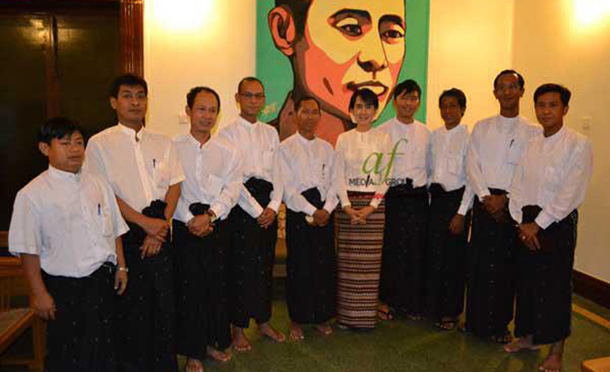RANGOON — President Thein Sein has met with representatives of varied political, economic and social interests since his reformist government took office, leaving some analysts to wonder why he has yet to meet with perhaps Burma’s most prominent activists, the 88 Generation Students group.
They argue that dialogue between the president and the group—considered by many to be the most powerful civil society organization in the country—should come naturally.
“Both are dedicated and working to contribute to the good of the country, so I think they should be meeting-friendly,” Maung Maung Naing, a Rangoon-based political analyst, told The Irrawaddy.
Following the 2011 inauguration of a new quasi-civilian government led by Thein Sein and the release of the 88 Generation Students’ leaders in January 2012 under a mass amnesty, speculation arose that the former would meet with the latter, but to date that meeting has not taken place.
Instead, the group’s founder Min Ko Naing was called in for questioning by the Ministry of Home Affairs over the content of a recent public speech he made.
On May 4, Thein Sein met with leaders from 12 political parties, most of whom represented different ethnic groups that had contested in the 2010 general election.
Hla Maung Shwe, a member of the president’s National Economic and Social Advisory Council, insisted that Thein Sein is willing to meet with people of various political and ideological persuasions.
“The president has said that his government would get what it wanted sooner in its effort to re-establish the country only if it gained strength from different people in political, economic, social and other fields, so I think he has tried his best to see people from those areas,” Hla Maung Shwe said.
He added that Thein Sein had met with representatives from political parties and civil society organizations, and would continue to do so in the future.
Despite the lack of personal attention from Thein Sein, ministers from the President’s Office such as Aung Min and Soe Thein have reportedly held occasional discussions with Ko Ko Gyi, another leader of the 88 Generation Students.
Last year, the two ministers unexpectedly attended the 24th anniversary of the 1988 pro-democracy uprising, which was organized by the 88 Generation Students. The ministers further surprised with a donation of one million kyat (US$1,250) to the group. They told the 88 Generation Students’ leaders that they were there with the permission of the president.
The Irrawaddy contacted Ko Ko Gyi to find out the group’s opinion on meeting with Thein Sein, but he refused to comment. The activist was included in a recently formed committee led by Soe Thein, which is charged with verifying the country’s remaining political prisoners.
Nay Zin Latt, a political adviser to president, told The Irrawaddy that he thinks the president could only, and would, meet with the group only after it had formed a legal political party, because Thein Sein has so far met with registered political parties alone.
He said presidential advisory board members, however, occasionally meet with leaders of the group, which has helped to mediate various instances of civil unrest, including the recent communal violence between Buddhists and Muslims.
Last week, leaders of the 88 Generation Students met with Yang Houlan, the Chinese ambassador to Burma, and called on China to revisit all Chinese contracts for a host of ongoing projects in Burma. The activists argued that too little was known about the project deals, many of which were inked under the former military regime.
Thein Sein is currently on an official visit to the United States, as are leaders of the 88 Generation Students, Min Ko Naing and Ko Ko Gyi, on a separate trip.

















